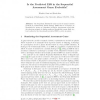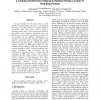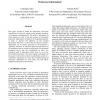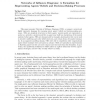98 search results - page 5 / 20 » Using iterated reasoning to predict opponent strategies |
GECCO
2004
Springer
15 years 5 months ago
2004
Springer
The Sequential Assessment Game model of animal contests predicts an evolutionarily stable strategy (ESS) that is a sequence of thresholds for giving up. Simulated evolution experim...
104
click to vote
JDCTA
2010
14 years 6 months ago
2010
To gain insights into the neural basis of such adaptive decision-making processes, we investigated the nature of learning process in humans playing a competitive game with binary ...
ATAL
2004
Springer
15 years 5 months ago
2004
Springer
This paper presents a model for integrative, one-to-one negotiation in which the values across multiple attributes are negotiated simultaneously. We model a mechanism in which age...
JAIR
2008
14 years 11 months ago
2008
This paper presents Networks of Influence Diagrams (NID), a compact, natural and highly expressive language for reasoning about agents' beliefs and decision-making processes....
112
click to vote
LICS
2009
IEEE
15 years 6 months ago
2009
IEEE
This paper presents a new lower bound for the discrete strategy improvement algorithm for solving parity games due to V¨oge and Jurdzi´nski. First, we informally show which stru...




